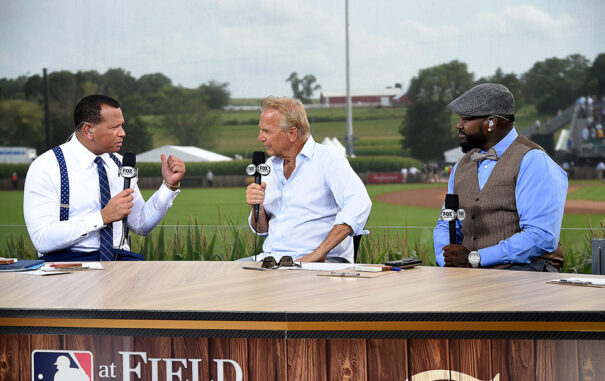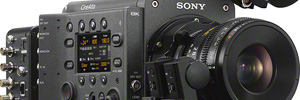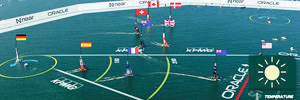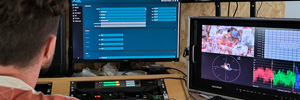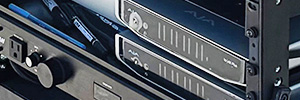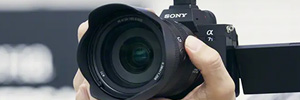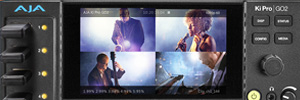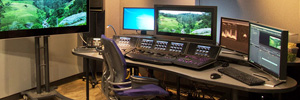FOX Sports brings cinematic look to ‘Field of Dreams’ (MLB) with the help of FS-HDR from AJA
The AJA FS-HDR has helped FOX Sports achieve a cinematic look for the broadcast of the MLB ‘Field of Dreams’ special.
The main technical objective for the MLB ‘Field of Dreams’ match was to achieve a post-produced, but fully live-produced look. To accomplish this goal, Brad Cheney, vice president of field operations and engineering for FOX Sports, led a large technical team to fuse live coverage of an MLB game between the Yankees and White Sox with pre-produced elements inspired by the Kevin Costner-starring movie of the same name.
The game, which took place in a custom-built stadium near the original Field of Dreams venue in Dyersville, IA, was shot using a wide selection of cameras and prepared footage in a variety of delivery formats to suit different distribution needs. To achieve a cohesive look with a cinematic feel, the Fox Sports team used 60 FS-HDR from AJA for signal conversion, frame sync and colour grading.
Cheney himself praises the AJA tool: “Creating shallow depth of field looks requires specialized equipment, like cinematic cameras with large sensors and prime lenses. To recreate the color, warmth, and feel of the movie Field of Dreams, we leaned on those camera setups and our AJA gear. Using FS-HDR, we were able to create that curve which strikes the right balance between broadcast and cinematic, and an ability to move between them seamlessly. Having such a robust color correction toolset built into our converter was paramount, considering we used 1080p and 4K SDR camera sets.”
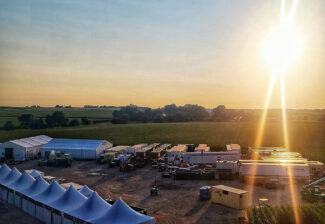 12 HD HDR film cameras
12 HD HDR film cameras
Preparations for production began more than a year in advance. During this time, FOX’s postseason baseball group, video team, replay team, lead technical director, technology division, ENG team and drone professionals worked closely with equipment suppliers to explore their options. Ultimately, they settled on 1080p HDR and HLG BT.2020 wide colour gamut as the single primary production format. At the same time, they wanted to remain flexible for distribution partners who required other delivery formats.
The team used an amalgamation of cameras throughout the production, including both broadcast and 12 cinema cameras. The camera selection included a Sony Venice with PL mount lenses; Sony F55, 4300, 5500 and P50 cameras; and RED cameras, including KOMODO, as well as 1080p capable POV cameras buried in the field, and drones. However, incorporating different camera formats into a cohesive look required a myriad of conversion capabilities. Throughout the entire production, FS-HDR has been tasked with meeting this need, as all film camera sources have gone through it.
“Starting with the highest image quality possible will always result in the best final product, and even though much of the audience tuned into the feed in SDR, we wanted to do as much as we could in HDR to elevate the viewing experience. AJA FS-HDRs helped make that possible. They allowed us to create that cinematic look we were going for with full range color correction,” explains Cheney.
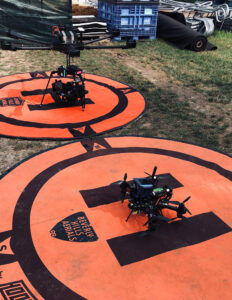 Frame rate
Frame rate
Overall, the process required a significant number of hours of R&D, with the team testing different equipment configurations and weighing up their options. In terms of frame rate, in some situations 24p was a perfect fit, while in others it turned out not to be the right fit, in which case the team opted for 29.97p: “Ultimately, our approach ensured we had the right conversion and settings in all the right places and gave us an appreciation for recent technological evolutions. It’s amazing that you can have an RF transmitter that can do 24, 25, 29, 50, 60 and 59.94, and the same thing is to be said for conversion gear like the FS-HDR that can do so many things at once.”
“With the FS-HDR, we can better control what the picture will look like, because we can quickly move between looks, line them up, and A/B them to get a clear picture of what’s going on. In the end, this was key, because the timeline was tight, and we had a set amount of time to make choices in a live environment. We made a lot of choices based on research leading up to the production that got us to a concept of where we wanted to be, and once the real-world lighting conditions showed up, we knew what we needed to do to get there,” adds Cheney.
The day of truth
The next phase of testing came when the team arrived in Iowa the week of the event. There they determined the final approach to combining the look they had established for the all-star party with that of the original set and film, as well as real-time environmental conditions such as natural lighting. They presented several options to the production, and then made final modifications to the equipment and refined the workflow until the desired look was achieved.
Having successfully executed the project to rave reviews from fans, Cheney and the team are confident they now have the right roadmap to deliver similar quality broadcasts in the future: “We now know how to execute something like this quickly, so moving forward, we can easily provide this amazing depth of field and color to audiences in live broadcasts where it makes sense. From an industry standpoint, we’re on the cusp of being able to do all the things we want to in sports with high frame rate cameras and with a cinematic look, things that just weren’t achievable five or ten years ago. We’ve now reached a point where this technique can be applied to other productions on a full-time basis versus just as an added feature for select matches, and that will be a game changer for the live production world moving forward.”
¿Te gustó este artículo?
Suscríbete a nuestro RSS feed y no te perderás nada.



